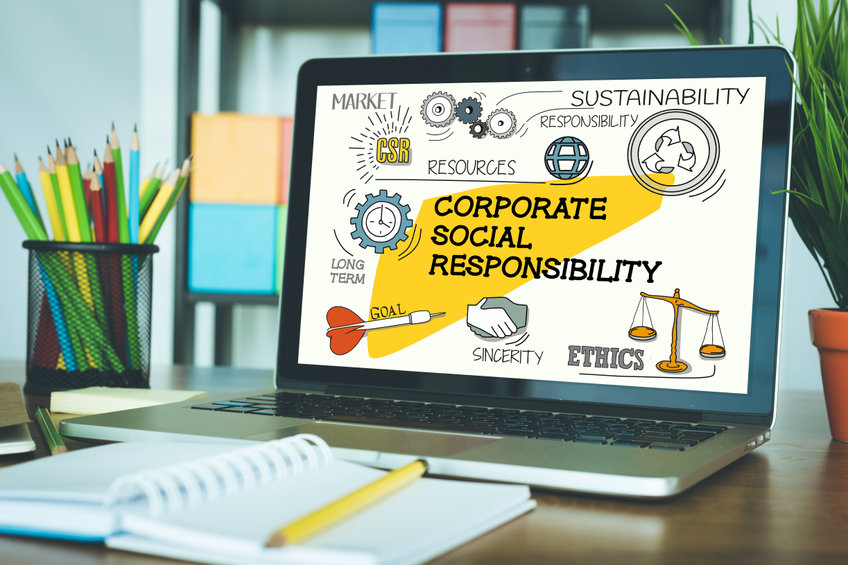
Now more than ever, it is essential for companies to focus on corporate social responsibility, or their effort to improve their communities, environment and societies in which they operate. Customers, employees, vendors and other stakeholders have a growing expectation that their values align with the businesses they work with. In fact, 70 percent of consumers are interested in hearing about the social, health, environmental and safety impacts of the products they buy and the company that makes them. Today’s buyers are well informed and conscientious about current events, social impact and ethical standards. They expect businesses to reflect these concerns and their role within them.
Benefits of Corporate Social Responsibility
Brands that can clearly communicate their values have an edge over the competition. Some of the benefits of a well-executed corporate responsibility include:
- Improved public image. When companies demonstrate that they are a brand committed to helping others, they build trust and connect with target audiences on a human and community level.
- Enhanced brand awareness and differentiation. When businesses commit to ethical practices, news spreads. The more people hear about your brand, the more business it can attract.
- Increased customer loyalty. Studies show that 70 percent of customers are more loyal to companies that showcase their social responsibility efforts.
- Greater ability to attract and retain talent. Today’s employees find fulfillment in working for a socially responsible company.
- Better financial performance. When companies practice sustainability, such as by reducing packaging or energy use, the savings can add up quickly.
Being mindful, accountable and communicative of your corporation’s impact on society and the environment is much easier said than done. To create and implement a successful corporate responsibility program, start with these four pillars.
Four Pillars of Corporate Social Responsibility

There is no straightforward guide on how to be a socially responsible organization. There are four primary areas of social responsibility to consider when establishing business strategies and communicating values to target audiences.
- Ethical Responsibility
Fair and ethical business practices require ongoing awareness of laws and regulations, current events, shared communal values and cultural principles that impact both local and global markets. By following these influences, businesses commit to fair treatment of employees, ethnically sourced materials, workplace equality and safety. Research shows that 64 percent of consumers consider themselves “belief-driven buyers.” This means they are willing to buy from or boycott a brand because of its position on social or political issues. As a company, it can be challenging to take a stance that speaks for the entire organization. When buyers and stakeholders align on larger issues such as human rights, it humanizes your brand.
- Environmental Responsibility
As our understanding of environmental concerns grows, corporations must take stock of how business activities impact the planet. Organizations play varying roles in the extraction and use of natural resources, as well as make contributions to greenhouse gas emissions, pollution and waste. That’s why it’s vital for companies of all shapes and sizes to take ownership of their environmental responsibility. Industry, company size, location and logistics all play a role, so it’s necessary to evaluate the current impact at all stages of the business cycle. Then, take the necessary steps to reduce negative impact and implement sustainable business practices in the ways that make sense for the corporation. Sustainability practices include clean air initiatives, carbon footprint reduction, commute incentives and commitment to reusable or recyclable alternatives.
- Philanthropic Responsibility
Companies driven by philanthropic responsibility dedicate a portion of their earnings to charities and non-profit organizations. Consider that 70 percent of U.S. corporate funders increased their charitable contributions in response to the coronavirus pandemic. Philanthropic contributions can be on the small scale, such as sponsoring a local fundraiser or sponsoring a community event. As company size and profits grow, buyers expect the charitable impact to grow as well. When buyers understand that a portion of their purchase can go toward a vital cause that aligns with their values, it establishes a meaningful connection between buyer and brand. Be conscientious of which types of philanthropic activities align with the ideals of the business and customer alike.
- Economic Responsibility
Companies that practice economic responsibility prioritize doing good, not just making more money. By demonstrating their positive impact on the public, businesses can make meaningful connections with clients, employees and other important connections. It’s easy for businesses to say they care about something but committing resources to support those values is another story. For example, 78 percent of buyers believe how a company treats its employees is one of the best indicators of its level of trustworthiness. By practicing fair wages, communicating a transparent salary system and financially supporting employees’ health and wellbeing, an organization’s financial decisions can represent the values of its leaders, and actively make an impact. Another example of an economically responsible company would be choosing a supplier using sustainable materials, even if it costs more.
Choose and Own Your Impact

It can be easy to think that not publicly sharing an organization’s social, political or cultural stances could open the funnel for customers of all kinds. Yet, today’s buyers are more interested in ensuring their values are addressed by the companies they choose to patronize. Silence can make your brand appear insensitive, indifferent or uninterested. In today’s fast-paced news and communication cycle, misinformation can spread if brands don’t take control of their own story. Seek to actively share your organization’s social responsibility in ways that communicate the values and priorities that drive your business. Own the impact your organization makes on its communities and affect change where necessary to align business activities with the beliefs that back them.
